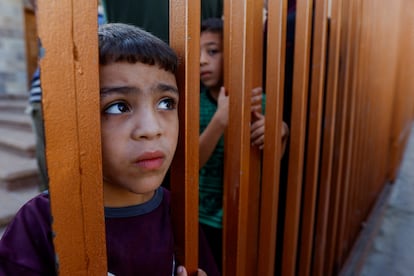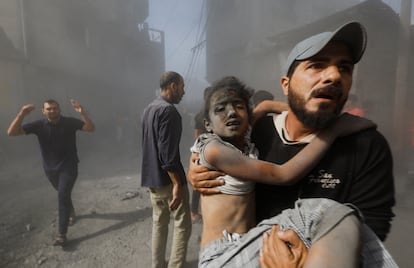Protecting children in Gaza: ‘My daughter asked me to cover her ears with my hands to reduce the sound of bombs’
Every 10 minutes a child is violently killed in the territory, according to an estimate by the NGO Save the Children, in an area where four out of five kids already had symptoms of depression, fear and grief


“I am awake because my 15-year-old son Mohamed cannot sleep. A while ago, my daughter Salma asked me to cover her ears with my hands to reduce the sound of bombs and make her feel safer. And my little girl, Sara, who is 12, has completely lost her appetite. The little she eats, she vomits and only wants to be alone.” It is 2 a.m. in Gaza. Najwa has finally managed to get an internet connection and has charged her phone using some of her neighbor’s batteries. This 51-year-old Palestinian women, an employee of an international humanitarian organization, does not want to give her last name and responds to this newspaper by WhatsApp from her home in the Nuseirat refugee camp in the center of the Gaza Strip. This is an area where the Israeli army asked civilians to remain because they would be safe, but the shelling is relentless.
Najwa lives with her husband and three of her five children and in recent weeks has sheltered three more families in her home, with seven children between the ages of one and 10. “As a mother, it hurts that I can’t reassure them or promise them that everything is going to be all right. They tell me they’re hungry and I can’t always give them a plate of hot food or fresh bread, they’re afraid at night and I can’t turn on the light to reassure them, because there’s no electricity and we live in the dark,” she explains.
In the Gaza war, a child is killed every 10 minutes, according to estimates by the NGO Save The Children. Most of the nearly 4,000 children killed, out of a total of some 9,000 Palestinian casualties, are unnamed and unaccounted for. They are the corpses pulled from the rubble like broken dolls; small lifeless bodies carried in the arms of desperate parents to hospitals that are barely operational; or small bundles in white plastic bags waiting to be identified and buried. “How many trucks would be needed to carry over 3,300 child-sized coffins?” the NGO asked this week. Since then, the number of victims has risen.
It breaks my heart to see my children’s dreams vanishNajwa, Palestinian mother
More than 7,000 children have been wounded by the bombardment, and some of them have had to be operated on or have undergone amputations under light sedation because there is no anesthesia left. Additionally, more than 1,000 are missing, probably under the ruins of the sites where they were sheltering, according to Palestinian figures. The rest of Gaza’s children, who represent almost half of its more than two million inhabitants, are refugees in their homes or in other people’s homes, schools or hospitals. There are no homes without children in Gaza. However, at this moment it is very difficult, if not impossible, to reach them or their parents from a distance. Gaza has no electricity and scarce telephone and internet connections, and foreign journalists are not allowed in, while local reporters are working tirelessly, endangering their lives every minute. At least 36 of them have died in the bombings, according to estimates by the Committee to Protect Journalists (CPJ).
Hunger and thirst
“Do I still live?” a bleeding child, aged about seven, persistently asks the doctor treating him after being wounded in a bombing attack. “Yes, you are still alive,” replies the medic. The footage of this exchange was recorded by Belal Mortaja, a Palestinian cameraman who has been documenting the events in Gaza, with a special focus on the suffering of the children.
The children are also hungry and thirsty. In the Hamdan family, who have taken shelter in Rafah, in the southern part of Gaza, in the hope of being evacuated, as they are all Spanish nationals, there are three young children between the ages of three months and three years old. Two weeks ago, they left their home within minutes, with practically nothing but the clothes they were wearing, fleeing from a bombing that tore their home apart. “My sister is desperate. There is no clean water to give them and the baby isn’t eating properly. They’re not going to find a doctor in these circumstances, and it would be dangerous to leave the house. On top of that, it’s starting to get cold in Gaza and the children have no warm clothes,” Ahmed Hamdan, the children’s uncle, who is in Spain, explains over the telephone.

One of Najwa’s biggest concerns is water. Every day, she and her husband set out at around 5 a.m. to see where they can buy water or get cans they can use for milk, tea and cooking. “Of course, we can’t have a bath, and that damages morale. The children’s too,” she says.
“They are adorable, intelligent kids... They like to live, have fun, dance and sing. They deserve much more than this life, where we only worry about survival. It breaks my heart to see my children’s dreams vanish,” says Najwa, while she repeats as if in prayer: Salma wanted to be a lawyer, “but now she’s lost interest in everything.” Sara dreams of learning to play the piano, and Mohamed says that now he just wants to “survive and leave Gaza to seek a life somewhere else.”
“It’s horrible that they are experiencing this, but nobody cares about human rights, humanitarian law, democracy. Everything is a lie. Our children are being massacred in front of this rotten world,” she cries. “I dread to think of families like ours, under the rubble, dead.”
“We have gone back to cave times”
From Khan Younis, also in the south of Gaza, Kayan sends a couple of photographs of what will be her family’s food for the day. The wood they retrieve from the street is used as firewood, and on a rusty iron grill they place a cooking pot with tomatoes and eggplants. “We have no gas, we have gone back to cave times,” says this teacher, mother of four children between the ages of five and 15, who have taken refuge in a relative’s house where there are 40 people, almost half of them minors. “As parents, we get up at dawn to take a number and queue at a bakery that is operating. Or several. They give us 15 rations of bread, and this isn’t enough for so many people. We need to go to at least two bakeries, with the risks that involves, because they’re being bombed. We leave the house, either my husband or I, just in case something happens so that one of us is safe,” she explains.
The woman also says that after the bombs they have a sort of gas that “burns the eyes, nose and throat” and especially affects the little ones. “The days seem to go on forever. It’s hard for me to play with them, I have no spirit,” she explains, before adding that her youngest daughter, Manal, cannot be left alone for a moment because she’s afraid and cries out for help when she is abandoned.
Before this attack, the Palestinian psychiatrist Yasser Abu Jamei, director of the only Gazan mental health center for children, had already warned of the psychological deterioration suffered by minors in Gaza. This fear overwhelms them when they are far from their parents, and they also suffer from major behavioral disorders and an increase in suicidal emotions. This doctor and other NGOs have also warned that the parents and caregivers in the Gaza Strip lose self-confidence, believing that they cannot protect their loved ones or support them properly on their path to adulthood, because of the constant poverty and violence. In a 2022 report, Save The Children warned that four out of five children in Gaza were living with depression, fear and grief, and that the numbers were worsening due to the Israeli blockade, in place since 2007.
“I think about the first day I will be able to go back to class once all this is over. How will I be able to stand in front of my students and teach them about life if our souls are going to be filled with death?” asks the Gazan professor, Talal Abu Shawish, in a conversation with this newspaper.
Sign up for our weekly newsletter to get more English-language news coverage from EL PAÍS USA Edition
Tu suscripción se está usando en otro dispositivo
¿Quieres añadir otro usuario a tu suscripción?
Si continúas leyendo en este dispositivo, no se podrá leer en el otro.
FlechaTu suscripción se está usando en otro dispositivo y solo puedes acceder a EL PAÍS desde un dispositivo a la vez.
Si quieres compartir tu cuenta, cambia tu suscripción a la modalidad Premium, así podrás añadir otro usuario. Cada uno accederá con su propia cuenta de email, lo que os permitirá personalizar vuestra experiencia en EL PAÍS.
¿Tienes una suscripción de empresa? Accede aquí para contratar más cuentas.
En el caso de no saber quién está usando tu cuenta, te recomendamos cambiar tu contraseña aquí.
Si decides continuar compartiendo tu cuenta, este mensaje se mostrará en tu dispositivo y en el de la otra persona que está usando tu cuenta de forma indefinida, afectando a tu experiencia de lectura. Puedes consultar aquí los términos y condiciones de la suscripción digital.








































